If you see a pigeon sitting still and not moving then there is a good chance that something is wrong.
It could indicate that they have a broken wing, have other injuries, are fearful, or have generalized malaise caused by an infectious disease.
As an Amazon Associate we may earn a small commission on purchases made through any Amazon links, this helps support us, thank you.
About to buy your first pigeon?
Click to view essential products to help you take the best care of them:
7 Reasons a Pigeon May Be Sitting Still & Not Moving:

This article was written by our qualified veterinarian Cristina.
This is part of our commitment to providing you with the most trustworthy veterinary advice for your pigeons.
1. A Broken Wing
Pigeons don’t show pain as other animals or even birds might and they are quite stoic when they are wounded.
But that doesn’t mean that they can’t suffer a variety of lesions, including bone fractures.
If a pigeon has a broken wing, it will not be able to fly, so it will sit on the floor.
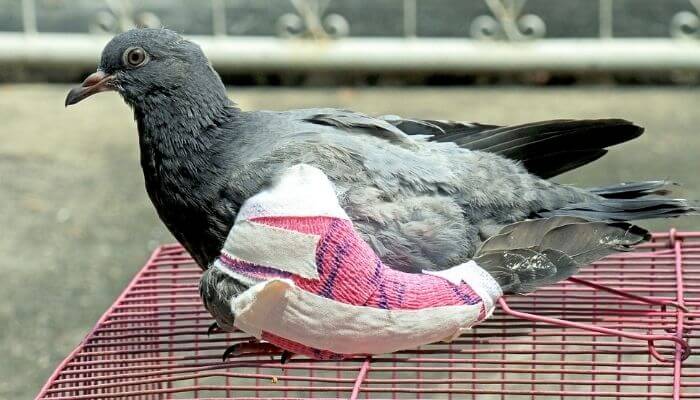
Depending on whether or not it has had the opportunity to feed or drink water, the bird’s energy levels might not even make it possible for it to make any additional movements.
Most of the time, a broken wing isn’t as easy to spot by people, especially if they have zero experience handling or raising pigeons.
If you see a pigeon in the garden sitting still and not moving, the best way of going about things would be to call a vet or your local wildlife center.
2. A Broken Foot or a Flesh Wound
This situation is slightly different because if you have the chance and you see the pigeon being immobile, you may notice that it has sustained a foot fracture or it has been shot by a pellet gun, for example.
However, if the bird is sitting with its feet curled underneath its body, something is wrong. Pigeons don’t tend to spend a lot of time sitting.
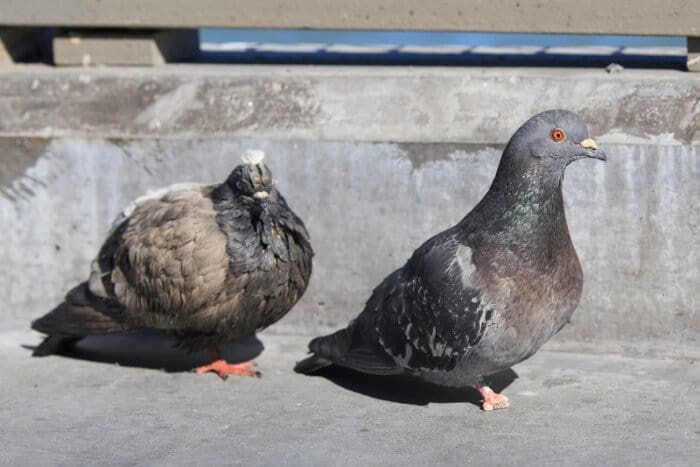
Depending on the severity of the fracture or wound and if it has involved actual damage to the bone, cartilage, or muscle tissue, the pigeon may lose its ability to stand completely.
If the wings aren’t broken, though, they will continue to behave somewhat normally.
When they rest, they will adopt a different body position compared to the rest of the pigeons in the flock.
They will prefer to avoid sudden movements so as not to inflict additional damage on the wounded part of their body.
3. Disease
If you have been raising pigeons for some time, you probably know that these birds can carry disease and can easily pass it from one to the other.
Some of the conditions that affect this species might relatively resolve on their own while others can produce a wide range of other symptoms, including lethargy.
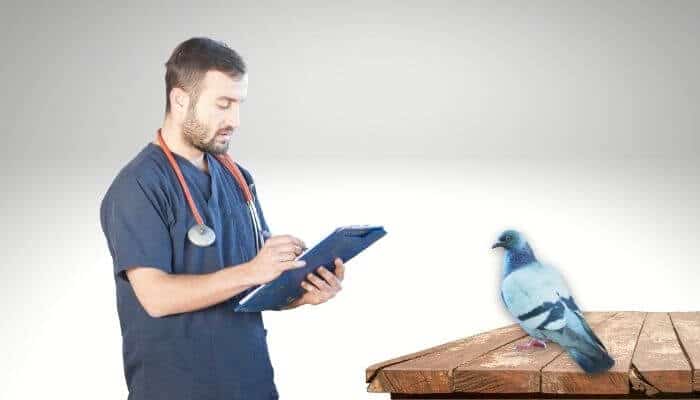
A pigeon that is sick, whether they suffer from a bacterial, viral, or parasitic disease, will express other clinical signs, such as discharge from the nose, eyes, or beak, diarrhea, vomiting, or a completely unusual body position (changes in the way the bird keeps its head, for example).
Since some of the diseases that pigeons carry can present zoonotic risks, if you see such behavior in one of your birds, contact your wildlife protection services as soon as possible.
4. Poisoning
This might not be a topic that people like to think about, but wildlife, in general, and birds like pigeons, in particular, can be poisoned by individuals on purpose or might come in contact with toxins by accident.
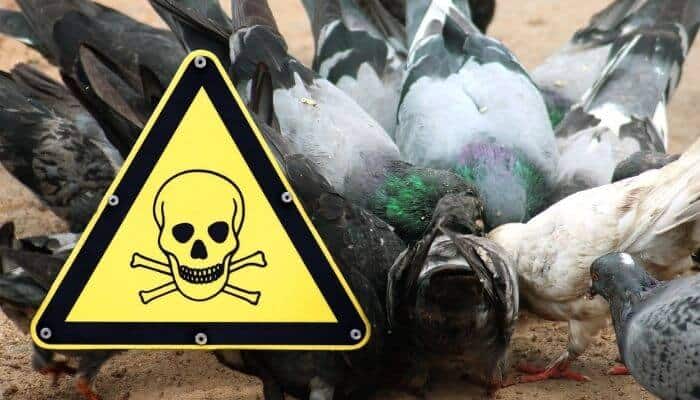
Sitting and not moving can be one of the first symptoms of poisoning, but it will be quickly followed by others, whether they be tremors, excitability, depression, convulsions, lethargy, or slipping into a coma.
5. Being Scared
Some pigeons might be wary of other animals or even other birds that might potentially threaten their life.
So, if they feel that they are in danger, they might retreat to a safe space and remain immobile until they feel safe again.
This is in fact one of the common reasons why pigeons sometimes end up on people’s balconies, on their terraces, or other covered areas where they can hide from their potential attacker.
In this case, the pigeon seems otherwise healthy and can perhaps show mild respiratory distress at first, especially after a strenuous flight.
6. Concussions
If they are struck or they hit an obstacle by accident, pigeons can suffer concussions like people do.
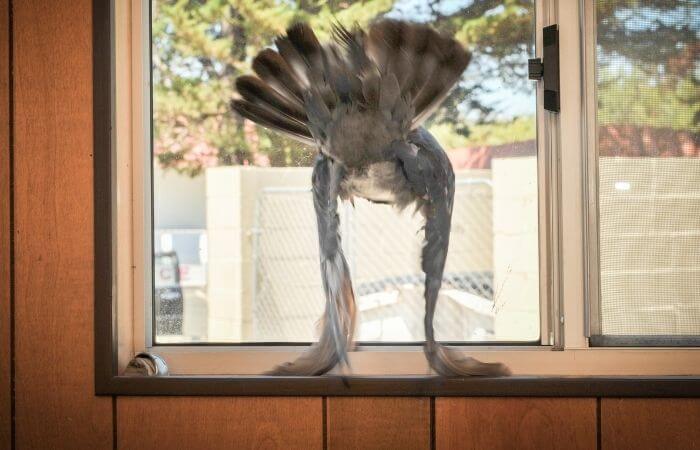
If this happens, the bird’s body will automatically force the pigeon to rest, sometimes in the unlikeliest of places.
7. Exertion
After flying for a long time, especially in the summer, even the most agile and healthy pigeons can feel the need to take a break.
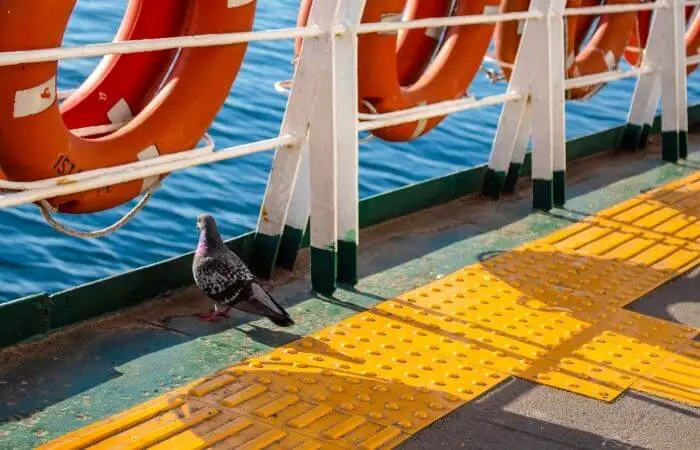
It doesn’t make sense for them to waste any more energy by standing, especially if they have difficulty breathing, although most will choose to anyway.
If one or two hours have passed and the pigeon is still in the same position, veterinary assistance is definitely necessary.
What To Do If You Find a Pigeon Sitting & Not Moving
As you might have noticed, the causes of this type of behavior can be quite diverse, so the way you should behave depends on each and every one of them.
However, if you see a pigeon sitting in the same spot for a prolonged period of time, you should try to help it somehow.
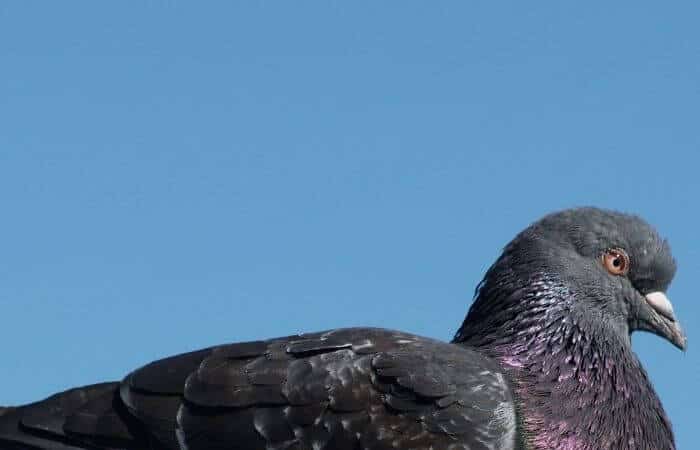
Most pigeons will avoid coming in direct contact with people mostly because they do not trust them.
If the bird isn’t severely injured, wasn’t poisoned, or hasn’t had its health affected in a significant manner, it should have some appetite for birdseed or water.
But if you notice that even after several hours have gone by, the pigeon doesn’t seem interested in either food or water, you should call the vet and ask them to come by.
Capturing a pigeon to try and take them to the pet clinic can be challenging, but it can be necessary if you want to save the bird’s life.
